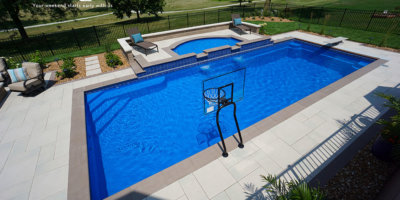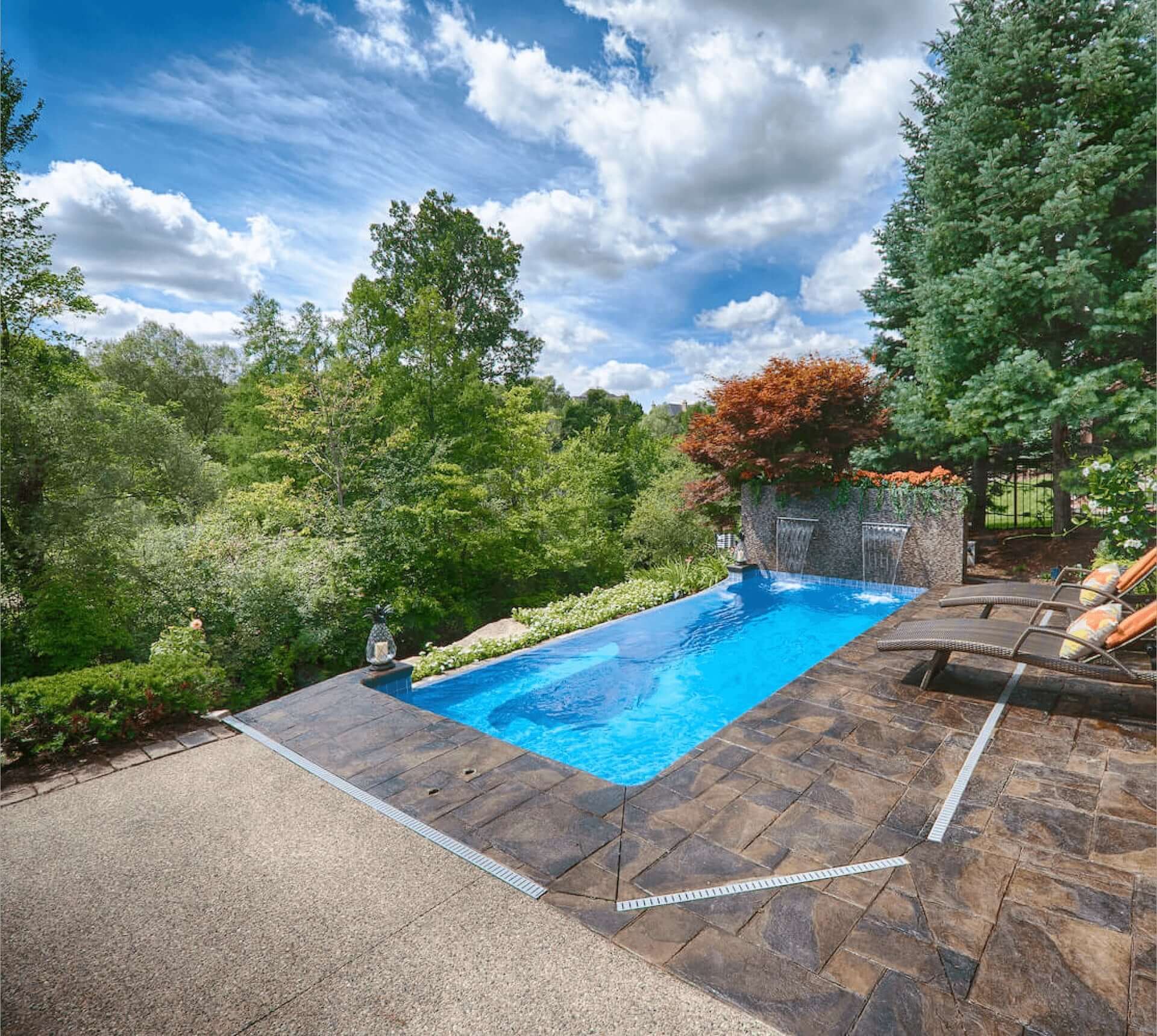877-929-(7665)
What is the Downside of Fiberglass Pools?
 If you are shopping for a pool, you will quickly realize there is a lot of information available on the topic of inground pools. You will likely first consider what type of pool is right for you as you compare. You may even have Googled, “what is the downside of fiberglass pools?” or “how long do fiberglass pools last?” to see what results you may get. (Smart move). Though it may seem strange that a fiberglass pool manufacturer is addressing this question, it would be even more strange to pretend that a fiberglass pool is for everyone. We want our pool buyers to make an informed decision, so this post will address some of the myths and truths about the downside of fiberglass pools.
If you are shopping for a pool, you will quickly realize there is a lot of information available on the topic of inground pools. You will likely first consider what type of pool is right for you as you compare. You may even have Googled, “what is the downside of fiberglass pools?” or “how long do fiberglass pools last?” to see what results you may get. (Smart move). Though it may seem strange that a fiberglass pool manufacturer is addressing this question, it would be even more strange to pretend that a fiberglass pool is for everyone. We want our pool buyers to make an informed decision, so this post will address some of the myths and truths about the downside of fiberglass pools.
Myth: Fiberglass pools are slippery.
Between the clear water shimmering in the sun and the high-gloss finish of a fiberglass pool, it’s logical that you would step cautiously into the pool or ease onto a built-in tanning ledge. However, technological advances have resulted in a gelcoat finish for fiberglass pools that is smooth but non-skid. Unlike the rough and porous surface of other inground pool types, fiberglass pools are more comfortable on your feet (and your pet’s paws) and will not snag your suit.
Myth: Fiberglass pool designs are “slim pickins.”
Some people assume fiberglass pool designs are punched out like widgets because they are manufactured in a controlled environment and shipped to the site. Go back a few decades, and there indeed were fewer options. However, today, fiberglass pools come in an array of sizes, shapes, and colors. Fiberglass pool manufacturers like Thursday Pools are constantly innovating to provide new options and built-in features, such as beach entry pools (Patent US 10,472,839).
Myth: Fiberglass is weak and brittle compared to other pool types.
Don’t be fooled by the name—fiberglass is not fragile. It’s lightweight (yet strong), not brittle, is designed with the ability to flex, and can last a long time when properly maintained.
Myth: I’ll need to hire pool maintenance.
It’s a common perception that pools are a lot of time-consuming maintenance. The truth is some pool types do require more time to be set aside for maintenance.For example, the porous surface of some pool types requires weekly work with a steel brush to keep algae at bay and a heavier chemical regimen. Fiberglass pools are the lowest maintenance option. Not only does this keep your time commitment down, but it also makes the lifetime cost of owning a fiberglass pool much lower than other options. You may want to hire a pool service to help open, close, or for an occasional check-up, but you can do much fiberglass pool maintenance on your own in a matter of minutes each week.
What are the true downsides of fiberglass pools?
Truth: Size is limited with fiberglass.
Because they are delivered in one piece, and the Department of Transportation limits what can be hauled down our roads without tighter regulations and a more extensive approval process, fiberglass pools are typically only 16 feet wide. So, if your pool dreams extend beyond 16 feet wide or 40 feet long, fiberglass may not be for you.
Truth: Custom shapes don’t come in fiberglass.
You can’t get a fiberglass pool shaped like a guitar. While the selection of fiberglass pools is impressive, it is a manufactured product. Your design comes from a multi-use pool shell mold. If you desire a lot of customization, you may opt for gunite.
Truth: The initial cost may be more than other pool types.
It will likely cost more upfront to purchase a fiberglass pool than some other pool types. However, because you’ll save on maintenance and there is no liner to replace, the lifetime cost of a fiberglass pool is lower. So, if you need to spend less initially, fiberglass may not be your best option. If you’re looking to get a ballpark estimate as to what a fiberglass pool may cost, check out our Pool Cost Calculator.
Truth: It’s not a DIY project.
A fiberglass pool is a lifetime purchase, but that’s only true if it’s properly installed. A DIY installation voids the pool’s warranty. In any case, we wouldn’t recommend that the average homeowner, or even an above-average DIYer, attempt to install a fiberglass pool. That’s one reason we don’t sell directly to consumers. Our independent dealers have the proper tools and training.
Truth: Access is essential. As we have already mentioned, your fiberglass pool shell arrives at your home as a finished piece—that’s one reason installation is so comparatively quick. The trucks and cranes often required for installation require space to operate. If you live in a tight and restricted area, the fiberglass pool you desire might not fit.
A Word About Fiberglass Pool Manufacturers
As a manufacturer obsessed with quality, we believe in the value of fiberglass pools. If you’re purchasing a fiberglass pool, you’ll want to learn about the manufacturer. In addition to their design offerings, check out how they make their pools, their manufacturing quality standards, and commitment to environmental stewardship.
More Research Options
You can do several things to ensure a clear picture of fiberglass pools and available competing options. Do online research, including YouTube, Pinterest, Houzz, and fiberglass pool reviews. Utilize our online resources, such as our “Everything You Need To Know About Fiberglass Pools” page. Or talk to an independent dealer. Consider what questions you might ask them in advance. Questions might include: Do they have a warranty? What type of pool is their specialty? What is their lead time? What pool shapes, sizes, and design options do they offer? What about financing?
